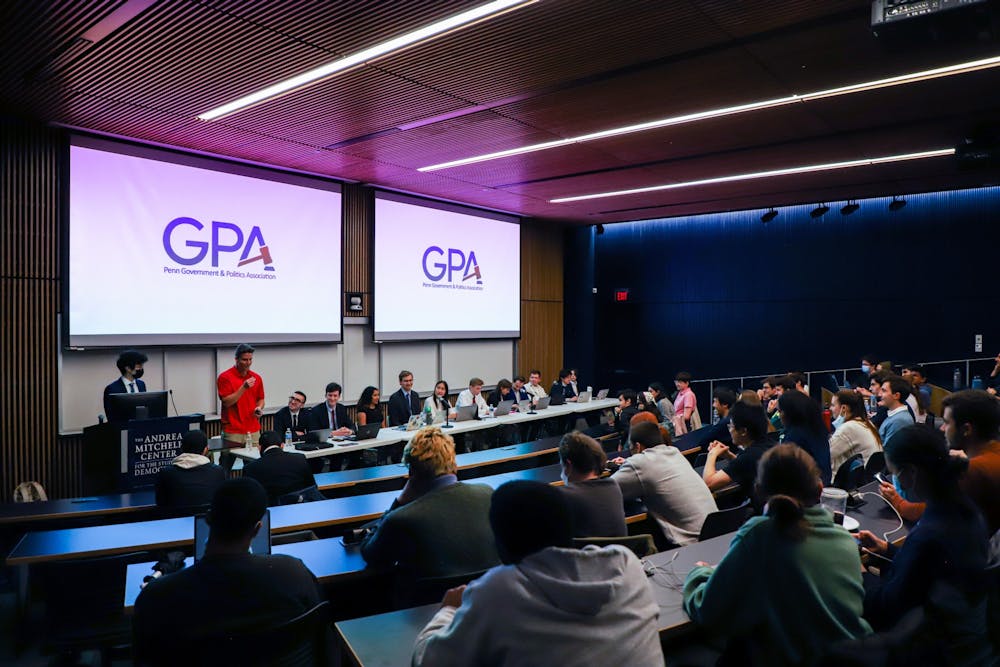Four of Penn’s political groups — from across the political spectrum — faced off in a in a debate hosted by the Government and Politics Association.
GPA partnered with the Andrea Mitchell Center for the Study of Democracy to host a political debate featuring Penn Dems, College Republicans, Penn Justice Dems, and Penn for Liberty. Roughly 75 people gathered at the Perelman Center for Political Science for nearly three hours on Wednesday evening to watch the representatives from each group answer questions about policy issues including COVID-19 precautions, foreign affairs, education, and the economy.
The event was moderated by GPA President and College junior Joshua Rose. Rose told The Daily Pennsylvanian that GPA reached out to each group beforehand, asking them to ensure they would be respectful towards others' beliefs.
Rose's first set of questions centered around whether the United States should relax COVID-19 policies moving forward.
The debate occurred just before Penn decided to pause its previous decision to lift the mask mandate in classrooms. After members of the community shared mixed feelings about lifting the mandate, Penn announced on March 24 that the University will keep the mask mandate in place for the time being.
Penn for Liberty representative and College senior Adam Robbins said that the country “should absolutely suspend all COVID policies at once.”
The representatives from other groups dissented with Robbins' opinion regarding pandemic precautions. Penn Dems representative and College first year Anusha Mathur said that students need to look outside of the United States to understand how COVID-19 is still affecting many abroad. Penn Justice Democrats and College junior Matthew Liu said he believes the pandemic raises the importance of the idea of healthcare for all.
"We can debate masks and vaccines all we want, but all this pandemic shows is that there is a need for healthcare for all," Liu said.
RELATED:
Pa. unveiled a new state congressional map. Here’s what Penn political leaders have to say.
New SNF Paideia program course on political empathy screens dialogue-based documentary
Rose then shifted the debate's focus to education policy. He asked about the state of free speech on college campuses.
Mathur argued that students' personal freedoms were sufficiently protected at Penn.
“This event demonstrates college campuses allow for productive dialogue,” Mathur said.
Other groups' representatives, however, argued that there is still progress to be made regarding the state of free speech on college campuses — and particularly at Penn.
Penn Justice Dems representative and College senior Tara Yazdan Panah disagreed with Mathur's sentiment, and said that "[Penn] students, faculty, and alumni don't have the place to share their opinions."
She added that she believes the dialogue at Penn is dominated by centrist voices and does not provide enough opportunity for others to share their ideas.
Rose then transitioned to asking questions about foreign policy. He asked the debaters what responsibility they believe the U.S. has to promote and protect democracy beyond the country's borders.
While Rose's foreign policy question did not specify one nation in particular for the debaters to address, the debaters spoke about the recent Russian invasion of Ukraine.
Students previously expressed concerns about the war to the DP. Several students from Ukraine voiced fears about the safety of their family members living in Ukraine and for the future of their home country.
After Robbins called Russia a “bloodthirsty” nation, Penn Justice Dems representative and College senior Noah Ryan responded.
"We need to have a more nuanced discussion about foreign policy rather than just calling an entire nation 'bloodthirsty,'" Ryan said.
The final topic addressed in the debate was economic policy. Rose asked the debaters to discuss the widening income gap in the U.S. and how to address this issue.
Penn Dems representative and College sophomore Amory Park suggested a wealth tax for those with a net worth of $50 million or more, and fully funding the IRS so that it can properly audit the highest tax payers.
“It’s only a common sense policy to tax the wealthiest Americans at such a small rate that it’s only a drop in the bucket for them but could make a difference in millions of Americans' lives,” Park told the DP in an interview after the event.
Penn Justice Dems representative and College senior Jack Cahill argued that the rich should be taxed at a much higher rate, and the United States should shift away from capitalist firms and focus on worker cooperatives.
Robbins immediately said he “reject[ed] the question’s assumption,” because he believes “there is nothing wrong with economic inequality.”
"It is not true that the rich only get richer at the expense of the poor, or vice versa,” Robbins said.
College Republicans representative and Wharton freshman Jack Klein then echoed Robbins' sentiments.
"Everyone is getting richer, just at different rates," Klein said.
Panah disagreed with Robbins' and Klein's assessments, responding to Penn for Liberty and College Republicans by asking them to consider why economic inequality is harmful in the first place.
"The quality at which you can live your life is based on income,” Panah said.
The event concluded with Rose thanking the audience for their attendance, and emphasizing the event's goal of creating a space for students to become more open to others' perspectives.
Penn Democrats representative and College sophomore Leo Cassel-Siskind said that events like these are important because they allow students to see that open dialogue is possible.
"There has been a lot of dispute on campus and in society about peoples’ political views, but I feel like everything was kept mostly civil tonight," Cassel-Siskind said.









